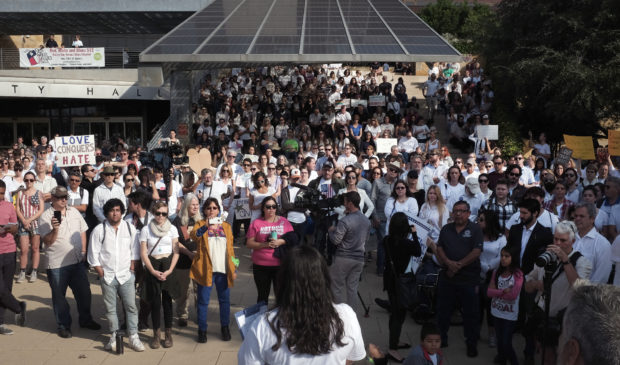Is Austin a sanctuary city? Good question.
Wednesday, November 16, 2016 by
Audrey McGlinchy, KUT Attempts to eliminate so-called sanctuary cities has begun anew with another Texas legislative session and new national leadership that has singled out these municipalities. And while Austin is often labeled a sanctuary city, it’s not clear that the city indeed is one.
Elissa Steglich, law professor with the University of Texas Immigration Clinic, said there are no clear legal guidelines for what makes a city a sanctuary city.
“There isn’t really a specific definition,” said Steglich. “It’s certainly not codified anywhere or appearing in law.”
While state Sen. Charles Perry (R-Lubbock) filed a bill Tuesday requiring local governments to comply with requests from federal agencies to detain undocumented immigrants, President-elect Donald Trump has promised to cancel federal funding to sanctuary cities. This year, the city of Austin received more than $42 million in federal grants.
Trump’s promise builds on a current administration unfriendly to sanctuary cities; earlier this year, the federal government updated rules disqualifying sanctuary cities from receiving Department of Justice grants.
Steglich said the term “sanctuary city” has been applied widely, to jurisdictions that have formal policies against cooperating with federal immigration requests – cities like Philadelphia and Chicago – and others that have adopted more symbolic measures.
“There are some cities where City Council has provided a kind of a pledge to or an affirming statement that all residents will be treated equally and have equal rights to access services freely in the city,” said Steglich.
In that regard, the city of Austin is a sanctuary city. The past two City Councils have adopted measures establishing the city as a place friendly to immigrants, but these policies have no enforcement power. Since Travis County oversees the local jails, that power lies with the sheriff. The current sheriff, Greg Hamilton, has maintained that he recognizes all requests from federal immigration agencies – including requests to detain someone with legal documents so that the agency can pick the person up.
Geoffrey Hoffman, a professor at the University of Houston Law Center and director of the school’s Immigration Clinic, said that without any enforceable policy, the term does not apply to Austin.
“I think it may be premature to state that it is a sanctuary city,” said Hoffman. “It’s clear that there is cooperation (with federal immigration agencies) going on right now.”
But, there is a new sheriff in town. Literally.
Sally Hernandez won the Travis County sheriff’s race earlier this month. Hernandez ran on a campaign of diverging from the current practice of cooperating with Immigration and Customs Enforcement, also known as ICE.
“Over the past few years, I have been meeting with immigrant advocates, victim advocates, lawyers, people within the sheriff’s office and elected officials, and there’s a consensus that some of the current ICE policies are discriminatory and harmful to public safety,” said Hernandez, who has stated that she will develop an official policy on how to handle requests from ICE. “Too often these policies prevent victims from reporting crimes because they fear deportation.”
A spokesperson for Hernandez said the new sheriff’s policy is not yet final, and she would not say the policy would be a blanket stance of ignoring requests from ICE.
With the election of Trump, some Council members have continued to reiterate Austin’s role as a city friendly to undocumented immigrants. Mayor Steve Adler and Council members Greg Casar and Pio Renteria attended an immigration rally outside City Hall on Sunday. Adler spoke of the city’s commitment to protecting immigrants without legal documents, but he did not call Austin a sanctuary city.
“At this time of uncertainty, I stand here certain about one thing, and that is that Austin will not waiver,” Adler told onlookers. “In Austin, we will continue to be a city where neighbors care for one another, where we instinctively and reflexively reach out to comfort and protect those around us.”
A press conference “concerning law enforcement, immigration and community safety” is scheduled for Thursday at City Hall.
This story was produced as part of the Austin Monitor’s reporting partnership with KUT. Photo by Jorge Sanhueza-Lyon/KUT News.
The Monitor’s work is made possible by donations from the community. Though our reporting covers donors from time to time, we are careful to keep business and editorial efforts separate while maintaining transparency. A complete list of donors is available here, and our code of ethics is explained here.
You're a community leader
And we’re honored you look to us for serious, in-depth news. You know a strong community needs local and dedicated watchdog reporting. We’re here for you and that won’t change. Now will you take the powerful next step and support our nonprofit news organization?






